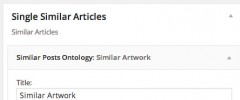Similar Posts Ontology wordpress plugin resources analysis
| Download This Plugin | |
| Download Elegant Themes | |
| Name | Similar Posts Ontology |
| Version | 1.0.1 |
| Author | Cory Fischer |
| Rating | 0 |
| Last updated | 2015-01-12 12:55:00 |
| Downloads |
54
|
| Download Plugins Speed Test plugin for Wordpress | |
Home page
Delta: 0%
Post page
Delta: 0%
Home page PageSpeed score has been degraded by 0%, while Post page PageSpeed score has been degraded by 0%
Similar Posts Ontology plugin added 5 bytes of resources to the Home page and 18 bytes of resources to the sample Post page.
Similar Posts Ontology plugin added 0 new host(s) to the Home page and 0 new host(s) to the sample Post page.
Great! Similar Posts Ontology plugin ads no tables to your Wordpress blog database.Does your website utilize categories and tags? Does it use custom taxonomies? If so, this plugin will find similar content based on all your taxonomies. There are two ways to show related posts within your page.
- The first way to show related content on your post is to use the widget provided. This only works when is_single() is true
- The second way to show similar content on your site is to use the pk_related_return($post->ID); function which can be called programmatically anywhere you wish!
The Widget included with this plugin gives you the option to limit the amount of posts; it allows you to determine which fields to show: Featured Image, Author, Date, and Excerpt (Title is required); and it allows you to determine which variant of the featured image to show: thumbnail, medium, large, or full.
If you find the Widget doesn't meet your needs or is too limiting, you can call the functionality programmatically using this function:
pk_related_return($post->ID, $args);
Where $post->ID is the ID of the post for which you are wanting to show related articles.
The $args parameter is an array with the following values available to you (more coming soon):
posts_per_page (int defaults to 5) thumbnail_size (string consisting of one of these values: "thumbnail", "medium", "large", "full". Defaults to thumbnail).
An example might be:
$args = array ( 'posts_per_page' => 6, 'thumbnail_size' => 'medium' );
The return value of pk_related_return is an array of objects that includes most of the fields within WordPress's posts table plus permalink and featured image.
Future Additions:
Allow the user to specify only certain content types (posts, pages, custom) in a request. This would allow you to specify only products get returned, or only blog posts. This would only be an issue if content types share taxonomies.




